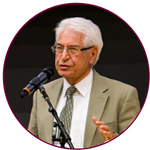
January 12, 2022
We asked McMaster researchers across fields of study to share predictions for the year ahead and insights from their area of expertise.
See below for insights from:

“This past year, successful retailers and restauranteurs were those willing to fundamentally redefine and reimagine their businesses.
They were responsive to different modes of fulfilment (in-store, online, curbside and delivery) and they partnered with other businesses to drive customer value.
Successful main-street retailers are increasingly creating compelling value propositions for customers that extend beyond the location to attract a regional, provincial or even national following.
A new year has brought with it a sense of déjà vu, with COVID-19 lockdowns front and centre. Businesses must continue to be flexible and creative — these next few months will be critical as retailers assess the success of their holiday season and ongoing viability.
There is also increasing pressure on financial markets to do their part when it comes to climate change. Banks are pressured to cease lending to fossil fuel companies and the divestment movement will build on successes from last year, including installing new directors at Exxon Mobil.
Responsible investing — the inclusion of social and environmental factors in investing — is on the rise. Look for individual “retail” investors to continue to develop an interest, and more importantly, an appetite to include responsible elements in their portfolio and to have these conversations with advisors.”
 —Brent McKnight, associate professor of strategic management
—Brent McKnight, associate professor of strategic management
Brent McKnight is studying resilience on main street with a team of scholars and partners at McMaster, Ryerson University, the Burlington Downtown Business Association and the Ontario Business Improvement Area Association. In other research, he explores how the market for responsible investing is being created within the retail sector. Read more of McKnight’s analysis on main-street resilience and retailers’ response to changed shopping behaviours.

“I am optimistic that in the next year, the pandemic will ebb. The pace of scientific achievement has been incredible. We are slowly (too slowly) vaccinating the world, which will ultimately ensure that the virus is kept in check.
I believe that over the course of this year, even if the SARS-CoV-2 virus doesn’t disappear, many aspects of our lives will start to feel more normal. We will go to parties, attend sporting events, and hug our loved ones without a second thought. Hospital surges will relent, and essential care will stop getting pushed aside to focus existing resources on care of COVID-19.
But we also know the COVID-19 pandemic has exposed deep cracks in the health-care system that have existed for a long time.
I hope that we will look back on our collective successes and failures in how we tackled the pandemic. And I hope that we will talk about how we can permanently patch the cracks.
We need to have a frank conversation about inequities in health care. We have to bridge the urban-rural divide that has left huge swaths of this province unable to access the best care. We have to talk about why individuals from marginalized groups, including Indigenous people, people of colour, and people living with poverty, have suffered disproportionate negative health impacts from COVID-19.
I hope that this is the year we can talk about real investment in health care: Investing in people and building a workforce where the carers are valued, and where the patient is the focus.
My greatest hope is that 2022 is the year that we start thinking creatively about how to rebuild an equitable, sustainable health-care system that allows everyone in it — patients and health-care workers alike — to flourish. I am hopeful that brighter days are ahead.“
 —Menaka Pai, associate professor of medicine
—Menaka Pai, associate professor of medicine
Menaka Pai is a hematologist and thrombosis medicine physician at Hamilton Health Sciences and Head of Service for Benign Hematology at Hamilton Health Sciences, and Quality Lead for Transfusion Medicine in the Hamilton Regional Laboratory Medicine Program. Read more of Pai’s insights on altruism, empathy and COVID-19.

“Instead of moving forward to 2022, it is looking more like we are moving backward to the beginning of 2021. But there are significant differences, and not all for the better.
While we are lucky that the death toll of COVID-19 and its many variants is lower, its effects are milder, and vaccination rates are substantially higher, the global picture is a lot darker.
Inflation rates are now taking root worldwide, with price increases topping on average 5 per cent and higher. U.S. democracy is becoming more precarious, and global tensions are rising on multiple fronts, including in Iran and Ukraine.
There appears to be little chance that inflation rates will subside soon. Any interest rate increase will exact a heavy toll on economic recovery, compromise the affordability of housing, and could easily rattle financial and stock markets. There is usually a choice between lower growth and higher inflation rates. Unfortunately, with rampant supply chain disruptions, we may be in for both slower growth and higher inflation.
In 2022, we are moving into a world that will increasingly be less globalized and inward looking, where me-first preferences and buy in the home country are becoming the norm. We are losing the benefits of cheaper imports and economies of scale and scope, and we may not be able to regain domestic manufacturing capacities and employment lost to rampant globalization.
Income and wealth inequality is now unprecedented. With it comes political instability, repressed aggregate demand, and irrational consumptive habits, where short trips to outer space are taking precedence over sharing vaccines with the poor of the world, lifting patent rights over critical medicines for survival, and supporting our less fortunate brothers and sisters at home.
We don’t have to be in this predicament. It is our choice and up to us to do better and to normalize our world. This is still possible, but not inevitable. There is lack of diplomacy and commitment to a more peaceful and just world. The spectre of devastating world wars is real and looming and to it is added the high occurrence of civil wars and destruction.
We have also lost sight of the catastrophic impending impacts of climate change. We only have a narrow window to save the planet from demise. Let’s do it by choice and not disaster. We still have time, but the window of opportunity is closing fast.”
 —Atif Kubursi, professor emeritus of economics
—Atif Kubursi, professor emeritus of economics
Atif Kubursi is President of Econometric Research Limited. In 1982, he joined the United Nations Industrial Organization as Senior Development Officer. Since then, he has worked as a team leader of several UNIDO missions to Indonesia, Thailand, Saudi Arabia, Kuwait, Sudan, and Egypt. In 2006 he was appointed Executive Secretary of the United Nations Economic and Social Commission for Western Asia (UN-ESCWA). Read Kubursi’s past analysis on supply and global economy projections in fall 2021 and spring 2020.

“With the widespread use of fossil fuels, deforestation, and land-use changes, human activities have contributed to the increasing concentrations of greenhouse gases in the atmosphere, causing global climate change. Humans have already heated the planet by roughly 1.1oC and some devastating impacts of global warming are therefore, now unavoidable.
In 2021 alone, flooding has devastated British Colombia, Germany and China. Blistering heat waves have killed hundreds of people, and wildfires have ravaged extensive area in Siberia, Turkey and Greece.
There is still a short window to stop things from getting even worse if nations start sharply cutting emissions immediately. The 2021 UN Climate Change Conference (COP26) has been widely described as a “make-or-break” chance to prevent climate change spiraling ever more out of control.
Nature-based solutions, although not a substitute for the rapid phase-out of fossil fuels, are being discussed as a climate mitigation approach while simultaneously providing human well-being and biodiversity benefits. The broad variety of nature-based solutions available — beyond just tree planting — must be encouraged in partnership with Indigenous peoples and local communities.
For example, Canada stores vast amount of organic carbon, 92 billion tonnes in the top 1 metre of peatlands alone, according to our Remote Sensing Laboratory study that was presented at the COP26 conference, and largely in lands stewarded by Indigenous communities.
Going forward, nature-based solutions should involve the protection, restoration and sustainable management of these lands through a process that fully respects and champions Indigenous rights and knowledge. Nonetheless, nature-based solutions are only part of the puzzles of climate change mitigation and must not delay urgent actions by nations to decarbonize our economies.”
 -Alemu Gonsamo, assistant professor, department of earth, environment & society
-Alemu Gonsamo, assistant professor, department of earth, environment & society
Alemu Gonsamo is a Canada Research Chair in Remote Sensing of Terrestrial Ecosystems. Read about Gonsamo’s recent research on the enormous impact of Canada’s carbon stores on global climate change.

“If this is indeed the year that we manage to gain the upper hand on the COVID-19 crisis, it will also be the year in which its political fallout comes into fuller view.
Relationships between governments and citizens have been strained in ways that younger generations in many democratic societies had yet to experience.
This dynamic has exacerbated widespread skepticism as to whether the liberal democratic order is equipped to confront some of the critical challenges of our time.
Waning confidence in our democratic institutions is likely to give way to further social unrest and political polarization in the year ahead.”
 —Clifton van der Linden, assistant professor of political science
—Clifton van der Linden, assistant professor of political science
Clifton van der Linden is the director of the Digital Society Lab. He is also the academic director of the McMaster Master of Public Policy Program and the founder and CEO of Vox Pop Labs. Read more about van der Linden’s research with Vox Pop Labs before Canada’s 2021 federal election.

“The COVID-19 pandemic is truly a global phenomenon, with relentless multiple waves having impacted almost all key aspects of life on Earth, from physical and mental health, to social well-being, to supply chain systems and the economy. In Earth’s recent history there is no other example of a global crisis with such profound impacts other than climate change.
COVID-19 has brought the whole world together to act quickly and to resolutely fight this pandemic. We are hopeful to see things turn around in 2022, and truly wish and hope for the world to come together to address climate change with the same urgency and determination given to the virus.
Climate change is a much bigger and longer-lasting challenge than COVID-19 for humanity, and it will require greater commitments by all of us.
COVID-19 —and the development of vaccines within months, rather than years — has shown that if there is will and determination, everything is possible, and no barriers can stop rapid progress.
To address climate change, we already have road maps in the form of various United Nations agreements such as IPCC Paris and Glasgow accords, as well as United Nations Sustainable Development Goals (SDPs).
We hope nations and world communities will come together to not only honour their existing commitments, but also go further where possible and accelerate the implementation of their commitments to achieve net zero carbon emissions and 1.5° C temperature goals.
We also hope that 2022 will be the year of innovative environmental discoveries and technological advancements that will lead to a better and brighter world. ”
 —Altaf Arain, professor, department of earth, environment & society
—Altaf Arain, professor, department of earth, environment & society
Altaf Arain is a Faculty of Science Research Chair in Environmental Sustainability and Climate Change. He is also the founding director of the McMaster Centre for Climate Change, and an adjunct professor with the United Nations University Institute for Water, Environment and Health. Read more about Arain’s insights on taking climate action.

